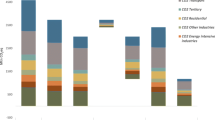Abstract
Energy policy in the European Union (EU) faces two major challenges. The first challenge is posed by EUs commitment to reduce greenhouse gas emissions to the atmosphere in the context of the international agreement on climate change. The second challenge is to keep ensuring European security of energy supply, while its dependency on external sources of energy is projected to increase. In this paper, two long-term alternative climate change policy scenarios for Europe are examined. In the first scenario, EU reduces carbon dioxide emissions by domestic measures; in the second scenario EU maximizes cooperation with the countries of the former Soviet Union (FSU). Impacts on carbon flows between the EU and FSU and on the external energy dependency of the EU are assessed with an applied general equilibrium model, GTAP-E, whose set of energy commodities is expanded with combustible biomass as a renewable and carbon-neutral energy commodity. The results show that there is a trade-off between economic efficiency, energy security and carbon dependency for the EU. The FSU would unambiguously prefer cooperation.
Similar content being viewed by others
References
Arndt, C. (1996), An Introduction to Systematic Sensitivity Analysis via Gaussian Quadrature, GTAP Technical Paper No. 2. West Lafayette, IN: Purdue University.
Berkhout, F. and A. Smith (forthcoming), 'Carbon Flows between the EU and Eastern Europe: Baselines, Scenarios and Policy Options', International Environmental Agreements: Politics, Law and Economics. Special Issue on Climate Policy and Carbon Flows between Eastern and Western Europe.
Böhringer, C. (2002), 'Climate Politics from Kyoto to Bonn: From Little to Nothing?' The Energy Journal 23(2), 51–71.
Burniaux, J.-M. and P. T. Truong (2002), GTAP-E: an energy-environmental version of the GTAP model, GTAP Technical Paper No. 16, Purdue University, West Lafayette, IN.
EC (1997), Energy for the future: renewable sources of energy, White Paper for a Community Strategy and Action Plan, COM(97)599 final, European Commission, Brussels.
EC (2001a), Towards a European strategy for the security of energy supply, Green Paper, Office for Official Publications of the European Communities, Luxembourg.
EC (2001b), Proposal for a framework Directive for greenhouse gas emissions trading within the European Community, COM(2001)581, European Commission, Brussels.
IEA (International Energy Agency) (2002), World Energy Outlook 2002, International Energy Agency, Paris.
Ierland, E.C. van, J. Gupta and M. T. J. Kok [eds.] (2003), Issues in International Climate Policy. Cheltenham/Northampton: Edward Elgar Publishing, Inc.
Helm, D. (2002), 'Energy Policy: Security of Supply, Sustainability and Competition', Energy Policy 30, 173–184.
Hertel, Th. W. [ed.] (1997), Global Trade Analysis: Modeling and Applications. Cambridge, USA: Cambridge University Press.
Huntington, H. G. and S. P. A. Brown (forthcoming), 'Energy Security and Global Change Mitigation', Energy Policy (Article in Press).
McKibbin, W. J., M. T. Ross, R. Shackleton and P. J. Wilcoxen (1999), 'Emissions Trading, Capital Flows and the Kyoto Protocol', The Energy Journal, Special Issue on The Costs of the Kyoto Protocol: A Multi-Model Evaluation, pp. 287–333.
Poussenkova, N. (forthcoming), 'Russia: A Country with an Unpredictable Past', International Environmental Agreements: Politics, Law and Economics. Special Issue on Climate Policy and Carbon Flows between Eastern and Western Europe.
Viguier, L. L., M. H. Babiker and J. M. Reilly (2003), 'The Costs of the Kyoto Protocol in the European Union', Energy Policy 31, 459–481.
Zapfel, P. and M. Vainio (2002), Pathways to European Greenhouse Gas Emissions Trading History and Misconceptions, FEEM Working Paper No. 85.2002, Fondazione Eni Enrico Mattei, Milano/Venice.
Author information
Authors and Affiliations
Rights and permissions
About this article
Cite this article
Kuik, O. Climate Change Policies, Energy Security and Carbon Dependency Trade-offs for the European Union in the Longer Term . International Environmental Agreements: Politics, Law and Economics 3, 221–242 (2003). https://doi.org/10.1023/B:INEA.0000005625.44125.54
Issue Date:
DOI: https://doi.org/10.1023/B:INEA.0000005625.44125.54




